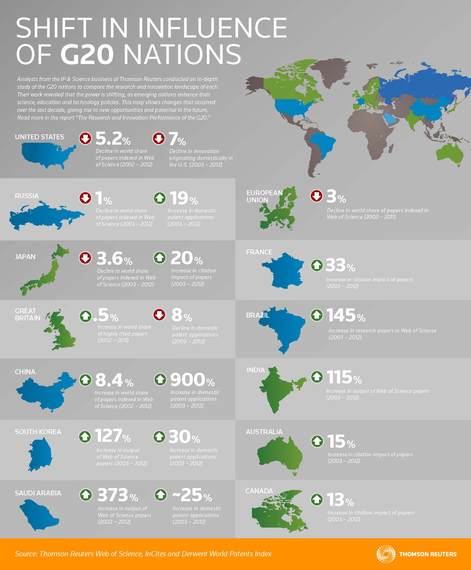The phenomenon of globalization and the realities of a seemingly shrinking world have wrought many changes in recent years -- notably, of course, in business and industry. Globalization's effect is also increasingly evident in science and technology, those drivers of economic prosperity. With the global landscape shifting and new national and regional powerhouses emerging, countries long established as eminent in science have begun to cede their shares of worldwide research output as well as their dominance in producing the most influential results.
To explore these developments, the Intellectual Property & Science division of Thomson Reuters focused on the world's largest economies, represented in the economic council known as the Group of 20, or, more popularly, the G20. Thomson Reuters analysts consulted two of the company's key proprietary databases: for publication and citation statistics, the Web of Science and its coverage of the world's most important scientific literature; for innovation as reflected in patent applications, Derwent World Patents Index, covering 48 patent authorities and two literature sources.
The report, "The Research & Innovation Performance of the G20," presents breakdowns of each G20 nation's particular areas of research concentration, along with assessment of scientific influence as reflected by citations. National trends in innovation are tracked via detailed information on patent applications -- including resident vs. non-resident applications -- and on the nation's share of specific global technologies and inventions.
The figures point to a rapidly changing world. China, in particular, has emerged as a scientific power, its share of world literature vaulting from just under 6 percent of Web of Science-indexed research in 2003 to 14 percent in 2012 -- a pace that will likely have China surpassing the United States in scientific output within the next decade. India, Brazil, and Saudi Arabia are also among the countries that have sharply increased their research output, building their world shares and eroding those of established North American and European nations.
Along with increased output, these emergent nations have also seen a rise in the worldwide influence of their research, as the citation impact of their published work has begun to climb from initially lesser levels toward parity with world baselines, and beyond.
In all, the report captures the transition of global science and technology, as embodied by the G20 nations, toward a very different picture in the coming years.
